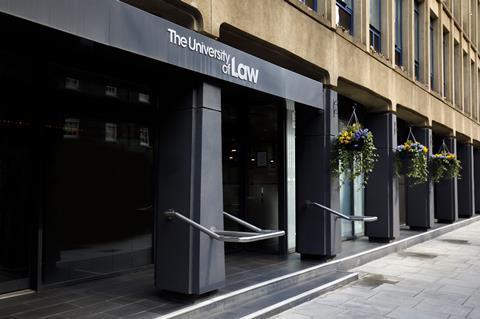The emergence of graduate schemes reflects the enhanced value and status of a career in technology at law firms
While tech has been critical to legal operations for decades, recent factors have propelled legal tech into the limelight. The pandemic accelerated digital transformation, forcing firms not just to adopt technology, but also to rely on it for all of their legal processes and business operations.

In the past year, law firms have been in the vanguard of generative AI adoption – but lawyers have been in the news for getting it wrong. All of this has kept law firms and their clients – and the media – focused sharply on legal tech.
As law firm leaders acknowledge the importance of tech to legal services, they have appointed more heads of innovation and artificial intelligence (AI), as well as IT and operations. These functions have grown dramatically. This, together with a well-funded global startup community (supported in the UK by popular events such as Legal Geek and government initiatives such LawtechUK), has intensified the legal tech war for talent.
Law firm roles within tech, operations and innovation do not require legal qualifications. But they do require an understanding of legal operations and processes, and the culture that underpins them, as well as tech skills and project management capabilities. So firms are developing graduate programmes to grow their own legal tech talent.
Tech-driven legal ops
As career opportunities in legal tech expand, more firms are developing bespoke training contracts. Some of the first movers were magic circle and global firms which have entire businesses focused on tech-enabled legal operations with the capacity to train the next generation of legal technologists.
For example, Allen & Overy’s law tech and operations graduate programme is part of its Advanced Delivery & Solutions business. This enables graduates from any discipline to work across legal tech, Fuse (the firm’s tech startup incubator), project management, the firm’s markets innovation group (which develops tech solutions for clients) and e-discovery (litigation support). Trainees are brought in to work on client projects in order to experience legal tech in action. There is no set career path. The programme includes tech training – for example in project management tools and e-discovery software – and involves hands-on work such as creating bespoke tech solutions for clients. But the website makes it clear that graduates from non-tech-related disciplines are welcome. ‘There is no one type of person who would be perfect in the programme,’ observed one graduate trainee.
Norton Rose Fulbright’s business and legal operations graduate scheme is part of NRF Transform, which works with the firm’s clients to develop tech-enabled solutions that resolve complex problems and improve legal service delivery. Much like a legal training contract, it involves four six-month rotations and the possibility of client secondments. Trainees come from many different academic disciplines, ranging from history to neuroscience. The firm is looking for transferable attributes – a scientist’s attention to detail, a historian’s focus on accurate data.
City collaboration
In 2021, six City law firms partnered with The University of Law and Positive Pricing to create a graduate legal operations scheme. This includes a four-week course and workshops covering legal tech, innovation, automation, process design and legal project management.
John Craske, director of innovation at CMS, explains that while some people took the view that there should be a training standard for legal tech, the firms who participated in the joint graduate scheme agreed that they all needed a pipeline for talent, so they decided to club together and train people up. They worked with the University of Law to design and deliver the programme and also build a community of legal operations trainees. This proved more challenging. ‘We try to do at least a couple of workshops, or partner talks a year [as well as the initial training course] to bring together all the trainees from all the firms,’ he says.

Recruiting diverse talent
While to some extent ‘legal technologist’ has become a catch-all term for a multi-disciplinary career at the business end of legal services, it is also about building innovation into a traditional profession.
Macfarlanes’ lawtech graduate programme, currently recruiting its third cohort, offers legal technologists a career path, although progression is not guaranteed. A graduate joins the scheme as a legal technology and innovation executive. They have the opportunity to apply for the role of legal technology and innovation officer on completion of a structured two-year programme.
The application process involves an online assessment, which is scenario-based and designed to identify the desired skills and personality traits. This is considered alongside a candidate’s written application. The second stage of the application involves a case study exercise, partner interview and group exercise. Apart from the partner interview, the exercises are scored application-blind to promote fairness.
Christopher Tart-Roberts, head of lawtech, and chief knowledge and innovation officer at Macfarlanes, explains that there is no typical profile for an applicant or successful candidate: ‘The opportunity is open to anyone with a strong interest in lawtech, whatever their background or degree subject. Diversity is important to us, in all its forms – it helps us to see things differently and come up with creative solutions.

‘What’s key for us is identifying candidates with a keen interest in both the practice of law and technology, it’s why the team is called “lawtech”. We want candidates to show a deep interest in technology and tech development, as well as a motivation to learn about the way law firms provide services to their clients and work as a business.’
Addleshaw Goddard describes its innovation and legal technology (ILT) graduate scheme as ‘designed to provide legal technologists with a comprehensive understanding of the operations of the ILT team, and equip them with the skills and knowledge necessary to become pioneers of legal innovation’. Trainees spend four months in each of six core seats. Some of these are technical, for example legal technology consulting, and research and development. Others, such as client projects, require a combination of tech, commercial and interpersonal skills. At the end of the scheme, trainees qualify into a level three legal technologist role – the first step on a legal tech career path.
'We want candidates to show a deep interest in technology and tech development, as well as a motivation to learn about the way law firms provide services to their clients and work as a business'
Christopher Tart-Roberts, Macfarlanes
Michael Kennedy, senior manager, innovation and legal technology, says the scheme is an opportunity for law graduates who are not looking to qualify into the profession and graduates in other disciplines to work in a law firm. ‘A law firm isn’t just lawyers, but many graduates don’t consider a law firm as an option if they don’t want to be a lawyer,’ he says.
‘While we attract a lot of law graduates – because law graduates are more likely to look at opportunities in law firms – we welcome applications from graduates in all disciplines. We truly believe in the value of diversity in knowledge, background and skills. We believe it brings a diverse pool of talent to our innovation group.’
Social mobility and inclusion is a key focus area. ‘We have partnered with an external organisation to introduce contextual recruitment and accountability into our graduate hiring process,’ Kennedy says. ‘Through the integration of RARE recruitment software, we are able to put candidates’ achievements into context and identify individuals from a wider range of backgrounds. This approach takes into account factors that may have limited social mobility, ensuring that our application process is based on merit and free from unconscious bias. We are proud to have created an inclusive environment where all candidates are given equal consideration.’
CMS is part of the consortium of law firms partnering with The University of Law and Positive Pricing to deliver a joint legal operations graduate programme (see box). John Craske, director of innovation, explains that each firm recruits separately, a few weeks before starting the course, so that trainees can start working at the firm before commencing the programme. At the end of the course, they go back to their respective firms to complete their training, spending six months in four different seats – for example legal tech, innovation, business intelligence (data) and project management.
CMS, like other firms, recruits graduates from any discipline, with a preference for those with work experience in a business environment. Candidates are invited to an assessment day, with individual and group exercises, and an interview. While this is similar to the process for trainee lawyers, it is focused on identifying attributes such as emotional intelligence, confidence, willingness to try new things, and a growth mindset.
‘Our view is that at this early stage of their careers, the technical skills can be developed if their attitude and mindset is correct,’ Craske says. ‘Early in the process we are looking for attention to detail and people who have taken time to research and understand the opportunity and make it mean something for them.’
Tomorrow’s legal technologists
Although more firms are offering legal tech training contracts, the cohorts are relatively small. For example, Macfarlanes typically takes on two or three graduates in each cohort; Allen & Overy recruits four; and Addleshaw Goddard recruits between six and 10. Small cohorts also mean there is stiff competition for trainee places, but this may change as firms see the value of a clear career path into legal tech and take on more legal tech trainees. In his book Tomorrow’s Lawyers, professor Richard Susskind rightly predicted 10 new job titles which reflect the growing role of technology in the legal industry. One of those was legal technologist. Legal tech graduate schemes reflect the value and status a career in technology has achieved within law firms.































No comments yet